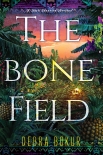The Bone Field Debra Bokur (novels for beginners .txt) 📖

- Author: Debra Bokur
Book online «The Bone Field Debra Bokur (novels for beginners .txt) 📖». Author Debra Bokur
“An important characteristic of the people I studied is that they would systematically reward the followers who worshipped or venerated them, and got rid of anybody who challenged them or their absolute authority,” said Hara, warming up to his topic. “It’s how they keep control, by removing any kind of threat to their position.”
“The location is important, too, isn’t it? Keeping people away from their friends and family?”
He nodded vehemently. “Seclusion is key. Not only physically, but keeping people from listening to the news or watching television or having access to visitors or outside influences like computers.” He stirred it all over in his mind. “Seems to me like Eden’s River is pretty textbook.”
* * *
By the time Kali got home, the sun was going down. Shadows sprang up in the yard, and the evening songs of birds filled the air. She sat on her front steps for a few moments, enjoying the tranquility of it all, then walked to the clearing in her yard. She kicked off her shoes and cued up her phone to a music selection, then laid it on the ground with the speaker volume turned up. The song she’d chosen was “E Ho ‘i I Ka Pili,” composed and sung by Keali‘i Reichel, one of her favorite performers.
The rich layers of Reichel’s voice filled the air. Kali wished that she could just sit on the steps in the shade and listen, but the coming performance at the cultural festival was weighing on her mind. Practicing was unavoidable. The last thing she wanted to do was disgrace the tradition, even if she had been pressured to appear instead of having made the choice herself.
Instead of swearing at Pait, she began to move, at first slowly and with hesitation, then more strongly, her body embracing the music through dance, the ancient form of hula that was sometimes said to have been gifted to the Hawaiian people by the goddess Laka. Kali danced the old form, the hula kahiko that existed long before outsiders arrived on the islands’ shores and missionaries proclaimed that the practice was fraught with evil. Later outlawed and made kapu, or taboo, hula had quietly been kept alive until a less rigid sensibility was restored and it was again allowed to be danced in public.
At the hlau hula school she’d attended as a girl, the instructor had been an impatient woman who had been critical of Kali’s natural skills. Her constant running and jumping, the instructor had told her, had given her tomboy muscles unsuited to the graceful movements that defined the dance. Kali had struggled particularly when it came to the lessons on rain. The strong muscles in her young arms had developed in response to hanging from trees, throwing balls, and doing backflips, and her teacher was unimpressed with Kali’s efforts to suggest raindrops falling gently from the sky.
“You have thunder in your arms!” her teacher had admonished. “Think of the rain landing lightly on the leaves and grass, not pummeling them!”
Kali could still remember the hot, red flush that had filled her cheeks. She watched the other girls and boys, growing vexed and impatient. Try as she might, none of her efforts seemed to please her teacher. When her grandmother asked her later that day if she had enjoyed her lesson, Kali had only scowled, declaring that she was through with hula forever, and would learn to fish instead.
Her grandmother had merely smiled. She waited patiently as Kali sat down, sullen, on the steps leading down from the lanai to the lawn, shoving her bare feet into the deep grass.
“I understand,” said Pualani. “When I was learning hula I used to go to the left when everyone else went to the right. One boy who was learning with me said that if I was told to follow a path into the mountains, I would end up in the sea instead.”
Kali had been skeptical. “You’re only saying that to make me feel better.”
“I’m afraid it’s quite true. Of course, because it was challenging for me, and especially because I wanted to prove that boy was wrong, I made it a point to learn every hand movement and every step—when to bend and when to raise my arms. But that’s just how I am. When someone tells me I can’t do something, it only makes me want to do it more, and do it better.”
Pualani looked out across the lawn at the shimmer of light that rose from the place where the sunlight met the surface of the sea. “Why don’t you help me in the garden today instead?” she asked Kali. “It needs weeding.”
Kali had agreed, and followed her grandmother to the side of the house where tomatoes and long beans grew on trellises next to a small, landscaped bed of flowers. Over the next hour, Kali and Pualani knelt and pulled weeds from the beds, reached and pinched suckers from the trellised plants, and bent to tidy the ground around their roots.
Later in the day, they walked down to the beach to gather shells and stones and bits of coral. They each filled a bucket and then carried their treasures back to the garden while the contents clanked against the metal sides. They poured the shells and other things onto the grass, spreading them out so they could see clearly what they had to work with. Then, side by side, they formed the things they’d collected into flower shapes in a border around the flower bed, filling the spaces between each stony bloom with round black lava pebbles, polished smooth by the sea.
“Let’s have something cool to drink,”





Comments (0)